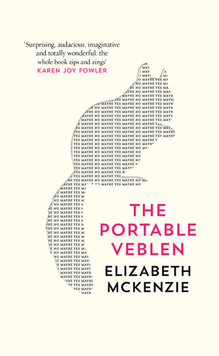
Unlike Veblen, who espouses the anti-capitalist values of her namesake, the economist Thorstein Veblen, Paul is ambitious. A research neurologist, when the pharmaceutical empire Hutmacher offers him the opportunity to begin clinical trials on the device he’s developed to minimise battlefield brain damage, he dismisses his ethical reservations with the word Seropurulent “an ironic superlative they used in med school for terrible things that had to be overlooked” (p62). Raised by hippies, the trappings of the consumerist world spell safety for Paul (p66):
Veblen too is scarred by her upbringing, with her scarily deranged father and living with her hypochondriacal and narcissistic mother. Just as Sofia in Hot Milk finds observing her mother’s moods the perfect preparation for a career as an anthropologist, Veblen’s mother’s legacy is her facility as a translator (p92):
when her mother yelled at someone in a public place and ran away, Veblen would swallow her shame and go up to the person who had been yelled at and say, “I’m sorry. What she was really saying was that she’s not feeling well and that when you took her parking place, she felt like you didn’t care.” When her mother yelled at someone in a restaurant and stomped out, Veblen would remain behind a moment and tell the waiter, “What my mother meant was that being corrected on what type of salad dressing to order reminded her of being scolded all time by her mother, who was really mean.”
Like Sofia, Veblen hasn’t yet managed to make this a career.
I was forewarned of the whimsy in relation to Veblen’s belief that she can commune with squirrels (which throws up, right from the start, the couple’s incompatibility, when Paul installs a trap in her loft), but I nevertheless balked initially at the faux naivety of the voice of the almost-omniscient narrator. But once I settled into it, I really enjoyed this humorous but profound meaning-of-life novel, shortlisted, along with The Glorious Heresies and The Green Road, for the Bailey’s prize. How could I not, when it encompasses so many of my favourite themes? There’s friendship in Veblen’s relationship to wacky Jungian analyst Albertine who, of course, does not take to Paul. There are dysfunctional families, with the envy of a special brother and the difficulty of knowing one’s own mind, as Veblen says regarding her lack of interest in bridal fanfare, “How do you know if you’re stubbornly missing out, or if it’s just not for you and that’s perfectly okay?” (p75). There’s fictional research, ethics and how medicine is tainted by both capitalism and the military, the latter featuring in my short story “Heroes”. I could have managed without the grey squirrels, though perhaps that’s because they’re rather a pest in my own garden. Thanks to 4th Estate for my review copy.

My giddy ant
“Because it works! Look around you! See what following the leader achieves.”
Tony wasn’t sure. Each time the line detoured around an obstacle, he was tempted to break ranks and beetle over to explore. Each time the queue paused, he wanted to wander off, to rush past his brothers and sisters to glimpse that mythical creature at the head. But he never dared. His mother had told him that, if he did his duty, he’d be reincarnated as a human. “Consider this life an apprenticeship for the next. In the glorious worker’s Republic of North Korea.”
For more on the culture of North Korea, see my review of The Orphan Master’s Son, which includes a mention, in the comments, of the non-fiction book Nothing to Envy. for more on the dangers of conformity, see my post The Tragedy of Obedience.





















 RSS Feed
RSS Feed





















